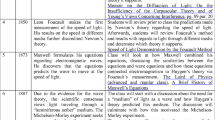Abstract
This inquiry uses teacher-candidate critiques of science lessons as a means of evaluating the effectiveness of an instructor's pedagogical approach to promote teacher candidate understanding of the nature of science (NOS) in a science methods course. Three cohorts of teacher candidates enrolled in a middle-years teacher education program were required to evaluate science lessons for their authenticity based on their developing understanding of the nature of science. The results indicated that the most detailed and accurate analysis of the authenticity of the lessons occurred in the cohort where the nature of science was developed (a) explicitly throughout the course, (b) through the use of exemplars of historical science development, and (c) through a setting that encouraged collaborative consideration of the nature of science.
Similar content being viewed by others
References
Abd-El-Khalick, F., Bell, R. L., & Lederman, N. G. (1998). The nature of science and instructional practice: Making the unnatural natural. Science Education, 82, 417–436.
Abd-El-Khalick, F., & Lederman, N. G. (2000). The influence of history of science courses on students’ views of nature of science. Journal of Research in Science Teaching, 37, 1057–1095.
Abell, S. K., & Bryan, L. A. (1997). Reconceptualizing the elementary science methods course using a reflective orientation. Journal of Science Teacher Education, 8, 153–166.
Akerson, V. L., Abd-El-Khalick, F., & Lederman, N. G. (2000). Influence of a reflective activity-based approach on elementary teachers’ conceptions of the nature of science. Journal of Research in Science Teaching, 37, 295–317.
Bencze, L., & Hodson, D. (1999). Changing practice by changing practice: Toward more authentic science and science curriculum development. Journal of Research in Science Teaching, 36, 521–541.
Driver, R., Asoko, H., Leach, J., Mortimer, E., & Scott, P. (1994). Constructing scientific knowledge in the classroom. Educational Researcher, 23, 5–12.
Duschl, R. A. (1990). Restructuring science education. New York: Teachers College Press.
Erickson, F. (1986). Qualitative methods in research on teaching. In M. C. Wittrock (Ed.), Handbook of research on teaching (3rd ed., p. 119–161). New York: Macmillan.
Hashweh, M. H. (1996). Science teachers’ epistemological beliefs in teaching. Journal of Research in Science Teaching, 33, 47–63.
Lederman, N. G. (1992). Students’ and teachers’ conceptions about the nature of science: A review of the research. Journal of Research in Science Teaching, 29, 331–359.
Lederman, N. G. (1999). Teachers’ understandings of the nature of science and classroom practice: Factors that facilitate or impede the relationship. Journal of Research in Science Teaching, 29, 331–359.
Lederman, N. G., & Abd-El-Khalick, F. (1999). Avoiding de-natured science. Activities that promote understandings of the nature of science. In W. McComas (Ed.), The nature of science in science education: Rationales and strategies (pp. 83–126). Dordrecht: The Netherlands: Kluwer Academic Publishers.
Lederman, N. G., & Zeidler, D. L. (1987). Science teachers’ conceptions of the nature of science: Do they really influence teaching behavior? Science Education, 71, 721–734.
Lewthwaite, B. E., & MacIntyre, W. R. (2003). Professional science knowledge and self-efficacy: A vignette study. STERpapers. In R. K. Coll (Ed.), STERpapers 2003 (pp. 58–80). Hamilton, New Zealand: University of Waikato, Centre for Science & Technology Education Research.
Martin, B., Kass, H., & Brouwer, W. (1990). Authentic science: A diversity of meanings. Science Education, 74, 541–554.
Ministry of Education (1993). Science in the New Zealand curriculum. Wellington: Learning Media.
National Science Teachers Association (2001). Project 2061: The nature of science. Retrieved September 14, 2003, from http://www.project2061.org/publications/ sfaa/online/chap1.htm
Reiss, M. J. (1993). Science education for a pluralist society. Buckingham, England: Open University Press.
Solomon, J., Duveen, J., Scot, L., & McCarthy, S. (1992). Teaching about the nature of science through history: Action research in the classroom. Journal of Research in Science Teaching, 29, 409–421.
Stinner, A. (1995). The current status of textbooks in schools. In S. M. Glynn & R. Duit (Eds.), Learning science in the schools: Research reforming practice. Mahwah, NJ: Erlbaum.
Author information
Authors and Affiliations



About this article
Cite this article
Lewthwaite, B. Critiquing Science Lessons for their Authenticity as a Means of Evaluating Teacher-Candidate Understanding of the Nature of Science. J Sci Teacher Educ 18, 109–124 (2007). https://doi.org/10.1007/s10972-006-9024-5
Published:
Issue Date:
DOI: https://doi.org/10.1007/s10972-006-9024-5




